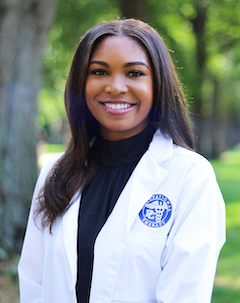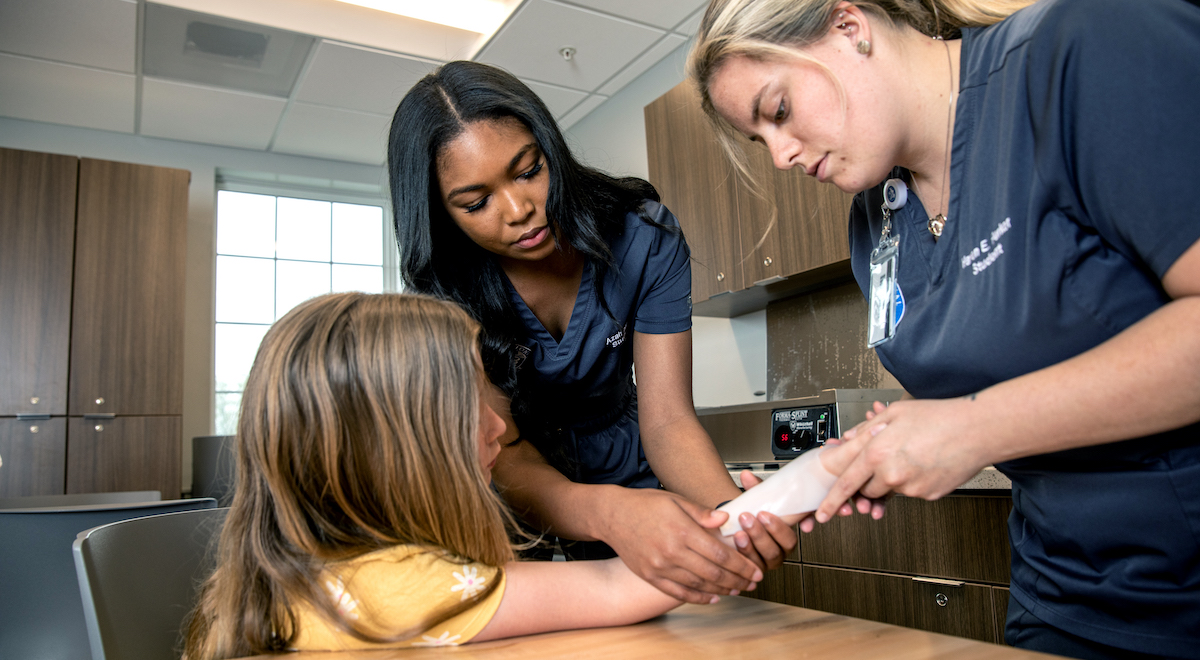Occupational Therapy graduate student builds pipeline for diversity at PC
First-generation student Azah Merrill collaborated with PC stakeholders for her doctoral capstone to build a pipeline for underrepresented students, removing barriers to study occupational therapy
by Sarah Murphy
Growing up, Azah Merrill often found herself in classrooms where she was the only person of color.

Azah Merrill ’23
“I consider myself an outgoing person, but I tend to be more reserved when I am in rooms where I don’t see people who look like me,” said Merrill, who spent her grade school years in Greenville.
Merrill’s mother, Tatia Merrill, is of Afro-Caribbean descent, and her father, James Merrill, is of African-American descent. Though they did not graduate from college, they understood the value of education and went to great lengths to ensure Azah received an excellent one.
“I remember them always working two or more jobs just to allow me the best possible educational experiences, and yet I often felt targeted and judged in these educational spaces,” said Merrill.
Following elementary, middle and high school, Merrill went on to become a first-generation college student, first at USC Upstate and then at Clemson, where she graduated in 2020 with a bachelor’s degree in psychology and a minor in social sciences. Merrill says it took time, but she learned to be strong and resilient when faced with situations in which she was the only person of color.
“I learned to never dim my light just so others feel comfortable,” said Merrill.
As she began mapping out her career, Merrill chose not to stop at an undergraduate degree. This summer, she is preparing to graduate from the Presbyterian College Occupational Therapy Doctoral Program, and is completing her capstone project on a topic very close to her: how to encourage and grow diversity in the profession of occupational therapy.
Building Diversity in Occupational Therapy
There are approximately 163,647 occupational therapists in the United States, according to the 2020 U.S. Bureau of Labor and Statistics. Of this population, 82 percent are white, 7 percent are Hispanic or Latino, 7 percent are Asian and 4 percent are Black.
Seeing these statistics hit home for Merrill. Paired with her own personal experiences as a minority, the statistics validated the issue of a lack of diversity within the occupational therapy profession. When the time came for Merrill to select a topic for her capstone project, she chose to tackle the problem head on.
“Reflecting on my cousin’s late diagnosis of autism spectrum disorder, I realize now that limited healthcare access and education contributed to the delayed diagnosis,” said Merrill. “Differences in economic and social conditions within the Black community are a huge problem in the health profession today, including the lack of diversity in OT. These inequities also play a large role in the continued health disadvantages of African-Americans.”
Merrill’s capstone targets the systemic barriers that underrepresented students may experience while applying to OTD programs. She focused on the PC OTD program and creating a pipeline for diverse minorities to consider the PC OTD. She seeks to make the occupational therapy career path more known to students in diverse communities.
“I’ve learned through my research and my own personal experiences that having someone who looks like me can create a sense of belonging in the classroom,” said Merrill. “Having diverse classmates in healthcare education programs can increase educational success and motivational outcomes, provide opportunities for cultural competence development, improve communication skills, expand knowledge, decrease bias and stereotyping, and enhance collaboration and teamwork abilities.”
During her capstone research, Merrill has hosted groups of underrepresented high school students who may not have accurate perceptions or knowledge about what occupational therapy is. She has met with institutional stakeholders to address the benefits of diversifying the OTD program at PC and create a framework to devote efforts to address this dilemma. She worked directly with Dr. Selena Blair, PC’s Rogers-Ingram Vice President for Justice, Equity, Diversity, and Inclusion, to create a sustainable framework that can be used with all graduate programs.
“Azah has poured her heart and soul into this project and I’m so thankful for the privilege and honor to have served as her capstone supervisor,” Blair said. “Her project not only culminates the breadth of her lived and educational experiences, but it also represents PC’s intentionality to ensure a more diverse student body in our graduate programs. With this project, Azah has left a legacy of innovative service and sustainable change, because her work is encapsulated in the College’s strategic plan and the overarching goal of the Justice, Equity, Diversity, and Inclusion (JEDI) division.”
“I was able to participate in a pipeline program that I believe shaped me to become a better student and helped prepare me for applying for graduate school,” said Merrill. “It is crucial that all students of diverse backgrounds pursuing occupational therapy have equal access to this opportunity.”
Advice for First-Generation Students
Being a first-generation college graduate, Merrill aspires to be the change in her family and community that allows future generations freedom from the generational and societal barriers of those before them.
“My intention is to be more than just an occupational therapist,” says Merrill. “I want to be someone who gets involved with my community and is able to provide resources that aren’t easily accessible to everyone. My mother always said that the smallest act of caring for another person is like a drop of water, making ripples throughout the entire pond.”
As she wraps up her doctorate and plans for the launch of a diversity pipeline that will leave ripples at PC, Merrill’s advice for other first-generation students is to never hesitate to seek support, embrace trials and tribulations, and be proactive.
“I learned that if you want anything, you have to take ownership,” said Merrill. “It may feel uncomfortable, but if you don’t take the steps towards your goals, you’ll regret it in the future.”
To learn more about the Occupational Therapy Doctoral Program at Presbyterian College, visit the program website.

